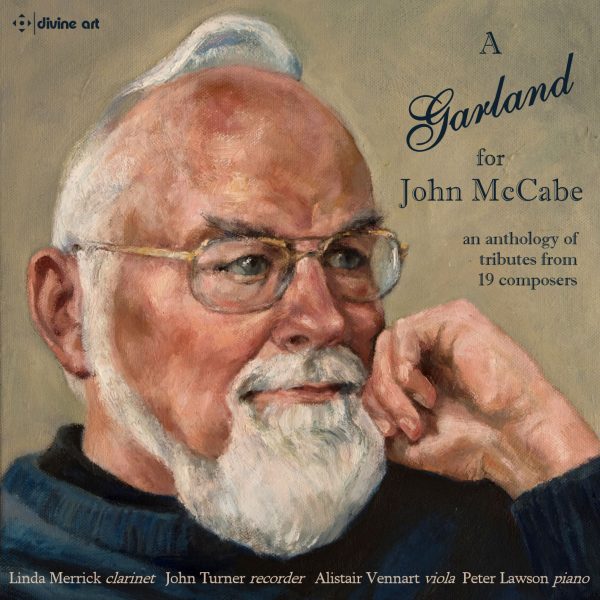Fanfare
John McCabe (1939-2015) was indeed a composer with a remarkable talent. I consider him to have been a genius, and have ever since I first became acquainted 30-plus years ago with his music through an EMI LP that contained his Chagall Windows and Symphony No. 2. He was also a superb pianist, and graciously promoted through performance the works of many composers in and outside of the UK. Thus, these tributes are well placed. The group of instruments that these 19 composers utilized is a non-standard group containing recorder, clarinet, viola, and piano. Perhaps this particular instru¬mentation was chosen because of that very fact. The present collection, actually, is not the only group of tributes collected from various composers by John Turner, the recorder player in this recital, there being another set of choral and organ works, and perhaps one day that collection will also be recorded.
So, what of the music written in McCabe’s honor (which I should spell as “honour” given his nationality)? I trust the reader isn’t expecting a detailed analysis of all 19 works, which are all short (timings ranging from 1:53 to 7:42, with an average length of around four minutes). Even the titles of the pieces will strongly suggest the stylistic diversity of the pieces. Opening the recital is one of the light¬est and most jocular, A Rag from McCabe by Peter Dickinson, a lively tongue-in-cheek affair. From this delightful opening the works take a decidedly somber turn, beginning with John Joubert’s Exequy for viola. “Exequy” is a funeral procession, but hearing the piece, one might guess the definition with¬out having to be told, and the piece traverses emotions from quiet reflection to outbursts of grief.
Various of the composers have come up with different ways beyond that one to remember their departed friend. Robert Saxton, Rob Keeley, and Martin Ellerby all use a succession of notes derived from the musical letters from McCabe’s name to generate their respective works. Malcolm Lipkin, on the other hand, includes a brief quote from a Haydn piano sonata in his In Memoriam John McCabe, re¬membering the composer’s recording of these works. Another approach was taken by William Marshall in his Little Passacaglia for recorder and piano. Here, the link to his deceased colleague is through the use of a 12-tone series that McCabe had employed in his Five Bagatelles for Piano. Another approach was to reflect something of the composer’s personality in the work written in his memory. This was done by Christopher Gunning in his Danse des Fourmis, in which he seeks to portray (and I think successfully so) McCabe’s delightful sense of humor. Still another inroad to the composer comes in musically depicting some place or thing that he was fond of. The former is demonstrated in Outback by Emily Howard, and the latter in Gary Carpenter’s Edradour, one of McCabe’s favorite malt whiskeys.
Of course some of my favorite works on the recital have no expressed connection to McCabe by the composer in his notes. One of these is Robin Walker’s And will you walk beside me down the lane?, an absolutely enchanting quartet for the four players. Another favorite is the Evening Changes of James Francis Brown, a piece that affirms life even as it remembers one who is no longer living. However, I found every one of these tributes quite moving, and doubtless John McCabe would have been brought to tears by any one of them. Given that the pieces are well performed by all involved, I have no trouble at all giving this collection an enthusiastic recommendation. I believe you will be touched, too.
@divineartrecordingsgroup
A First Inversion Company
Registered Office:
176-178 Pontefract Road, Cudworth, Barnsley S72 8BE
+44 1226 596703
Fort Worth, TX 76110
+1.682.233.4978












